I once told Bhagavan: ‘I have been here for many years. People meditate and get into samadhi. I close my eyes for a minute and the mind travels round the world ten times and so many long-forgotten things come up.’
Upon this Bhagavan said: ‘Why do you concern yourself about others? They may meditate or sleep and snore. Look to yourself. Whenever the mind goes astray, bring it back to the quest. There is a verse in the Bhagavad Gita which says: “To whatever side the restless, unsteady mind wanders away, one should check it and bring it back controlled to the Self.”’
But I was not satisfied and Sri Bhagavan said: ‘The child, who was woken up and given its milk after it had gone to sleep, says to its mother the next morning: “Mother, you never gave me milk last night.” Even so you had your fill.’
His analogy and assurance was convincing and consoling. I cannot even imagine what I would have been but for my contact with Sri Bhagavan. Countless have been the incidents which gripped my heart in bonds of ecstatic love to Him. The contact and impact that I have had with Bhagavan have been such as to make me feel that knowingly or unknowingly I must have done something in the course of my lives to deserve this unique blessing.
The lamp has been lit and ‘not all the darkness of the world can extinguish the light of the burning candle’. The contact and impact will and must lead me to the right goal, the ‘Be all and end all of human birth’.
One day when I was sitting by the side of Sri Bhagavan, I felt so miserable that I put the following question to him: ‘Is the sankalpa [wish] of the jnani not capable of warding off the destinies of the devotees?’
Bhagavan smiled and said: ‘Does the jnani have a sankalpa at all? The jivanmukta can have no sankalpas whatsoever. It is just impossible.’
I continued: ‘Then, what is the fate of all of us who pray to you to have grace on us and save us? Will we not be benefited or saved by sitting in front of you or coming to you? What use is there then for family men like me to gain by coming here to you?’
Bhagavan turned graciously to me and said: ‘Just as a trouble (or arrow) that comes to destroy the head goes away carrying with it only the turban, so a person’s bad karma will be considerably reduced while he is in the presence of a jnani. A jnani has no sankalpa but his sannidhi [presence] is the most powerful force. He need not have sankalpa but his presiding presence, the most powerful force, can do wonders, save souls, give peace of mind, even liberation to ripe souls. Your prayers are not answered by him but absorbed by his presence. His presence saves you, wards off the karma and gives you the boons as the case may be, involuntarily. The jnani does save the devotees, but not by sankalpa, which is non-existent in him, only through his presiding presence, sannidhi.’
I was filled with joy. Even today his presence is the most powerful thing and that alone, I am confident, saves me!
Bhagavan is God Himself and in saying this I do not refer to any of the personal gods of any religion but to the universal principle or pure consciousness. I dislike comparing him with any past personage, for there is no meaning in comparing incarnations of that one principle which has no second; but yet for our understanding, if at all we want to compare, it can only be with Christ or Buddha.
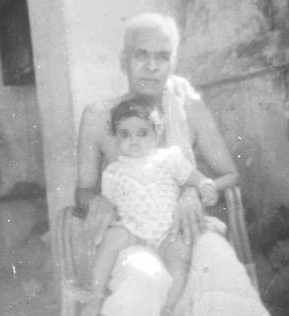
I never forgot, whenever I was talking with him or sitting in his presence, that here was God sitting and talking. It is our greatest fortune that the supreme consciousness appearing in the garb of a human body graciously undertook to come down to our level of understanding and bore the tremendous task of imparting to us the truth of Atma vidya. Such a thought always made me understand him and his talks better and more clearly.
Once a few very learned Sanskrit scholars were sitting in the old hall, discussing portions of the Upanishads and other scriptural texts with Bhagavan. Bhagavan was giving them proper explanations and it was a sight to remember and adore! At the same time I felt genuinely in my heart, ‘Oh, how great these people are and how fortunate they are to be so learned and to have such deep understanding and be able to discuss with our Bhagavan. Compared with them, what am I, a zero in scriptural learning?’
I felt miserable. After the pundits had taken leave, Bhagavan turned to me and said: ‘What?’, looking into my eyes and studying my thoughts. Then, without even giving me an opportunity to explain, he continued: ‘This is only the husk! All this book learning and capacity to repeat the scriptures by memory is absolutely no use. To know the truth, you need not undergo all this torture of learning. Not by reading do you get the truth. Be quiet, that is truth. Be still, that is God.’
Then, very graciously he turned to me again, and there was an immediate change in his tone and attitude.
He asked me: ‘Do you shave yourself?’
Bewildered by this sudden change, I answered, trembling, that I did.
‘Ah, for shaving you use a mirror, don’t you? You look into the mirror and then shave your face; you don’t shave the image in the mirror. Similarly, all the scriptures are meant only to show you the way to realisation. They are meant for practice and attainment. Mere book learning and discussions are comparable to a man shaving the image in the mirror.’
From that day onwards the sense of inferiority that I had been feeling vanished once for all.
One more assurance from Bhagavan which also he gave as a personal instruction is of absolute value for me in my sadhana. I cried to him that I knew nothing about Vedanta nor could I practise austerity, being a householder; so I prayed to him to help me by showing the reality or the way to it. I also frankly admitted that Bhagavan’s own method of self-enquiry was too hard for me.
He then graciously said: ‘You know Ulladu Narpadu [Reality in Forty Verses]. It imparts pure truth, deals with it and explains it. Go on reading it verse by verse. The words of the verses will, in course of time, vanish and pure truth [sat] alone will shine, like the snake relinquishing its skin and coming out shining.’ This is now my sadhana.
One day I was sitting near Bhagavan’s couch. I felt puzzled by the ancient teaching that everything that appears in the world is maya or illusion. I wondered how it could be when I saw Bhagavan, the couch on which he sat, the barrier separating me from Bhagavan and myself. How could all these be false? I asked Bhagavan, explaining my doubt.
‘Bhagavan, can all of us be unreal and non-existent? Please enlighten me.’
Bhagavan laughed and asked me whether I had had any dreams the previous night. I replied that I saw several people lying asleep.
He said: ‘Suppose now I ask you to go and wake all those people in the dream and tell them they are not real, how absurd it would be! That is how it is to me. There is nothing but the dreamer, so where does the question of dream people, real or unreal, arise? Still more of waking them up and telling them that they are not real? We are all unreal, why do you doubt it? That alone is real.’
After this explanation I never had any doubt about the unreality of the objective world. I constantly feel the reality in its unreal nature.
On another occasion he said: ‘Everything is unreal, like dream objects. However at a certain stage there exists truth, the reality, and world, the unreality; and a jnani’s job is to awaken the ignorant to the fact that what they see and feel is unreal and that the reality is their own being. This can be compared to an elephant dreaming of a lion and suddenly waking up and finding that the lion is unreal and that itself alone is real. The elephant is the jiva or individual, the dream is the unreal world and the lion, the jnani or Guru. The Guru is the link between the unreal and the real.’
On another occasion he said: ‘There is no jnani [realised man], jnana [knowledge] alone is.’
About the jivanmukta, realised while still living, Bhagavan said: ‘The jivanmukta is one without any thoughts or sankalpas [inherent tendencies]. The thought process ceases completely in him. Some power makes him do things. So he is not the doer but the one, who is made to do.’
Bhagavan Sri Ramana taught that Vedas and Upanishads are not mere book-lore or dry script, that moksha or liberation is not something to be attained in a distant future or after death, but that it is our ever-present nature, to be known and experienced here and now, that we are ever realised and that the simple and direct method is introspection and self-enquiry.
I once asked him: ‘Bhagavan, it is said that all roads lead to Rome. All religions lead to the same goal. How, can it be said that the quest “Who am I?” is the only way and the direct way?’
He replied: ‘Yes, all roads lead to Rome. But, on reaching Rome, you have to go to the citadel – the sanctum. What I say is just that.’
Sri T. Viswanatham was posted as Sub-registrar of Tiruvannamalai. He wrote to me about his good fortune to spend the closing period of about six months of his official career at this holy place and of the much-yearned-for opportunity he hoped to have the darshan of Sri Bhagavan and intimated to me that he would take up duty in about a week. I showed letter to Sri Bhagavan and the subject went out of my thoughts. About a week or so afterwards, at about 7-30 p.m., a person who looked orthodox was prostrating before Sri Bhagavan. Evidently he had read the notice board put up by the ashram management forbidding the devotees from touching Sri Bhagavan’s feet. This person, obviously wishing to avoid being objected to, but unwilling to forego his heart’s desire, observed the letter of the rules by clasping his hands behind him, away from Sri Bhagavan while he prostrated like a gymnast, and rubbed his head over the feet of Sri Bhagavan, as a calf would do when fondled, and Sri Bhagavan allowed full scope for this indulgence!
Then he turned towards me and said: ‘Sri T. Viswanatham.’ Who had told him so? The newcomer hadn’t spoken a word! Perhaps Sri Bhagavan had a sixth sense to scent a devotee!
The reactions of Sri Bhagavan to physical pain were always a mystery to me. I asked him if it was true that he once had (as I was told by a friend) boiling rice gruel (kanji) spilt over his posterior and that Sri Bhagavan knew about it only some time after.
He narrated the incident thus: ‘I was straining the kanji from a vessel in which rice was boiled. I was sitting on the floor. The boiling kanji was to be collected in a smaller vessel on the floor, but I was talking to some one and without my noticing the kanji fell on the floor, not in the vessel. As the floor sloped towards me, it got under my posterior. I knew about it only afterwards when it got cool!
‘Of course I got blistered and Zam Buck was later applied. No doubt there was pain after it was noticed, but who cares?’
The bliss of Self-realisation perhaps drowns any other experience!
Sri Bhagavan was not always the same. Most of the time he was a very pleasing person with a fascinating welcome smile. However, on occasion, he could be stern and look forbidding. At such moments people were struck with awe and deep searching of the heart.
One hot Sunday afternoon an old devotee placed before Sri Bhagavan some palmyra fruits [nongu].
Bhagavan severely remarked: ‘Why do you do this daily? You are a sannyasin. You must beg of others the wherewithal to procure these. You must say that they are for me. You know that I cannot eat them without others present sharing them and so you have to get some quantity, and this you do using my name, as though I desire it! Can’t you keep quiet and mind your business? You prostrate before me and think that you have won me over. Every prostration is like a blow on my head. All sorts of things are done outside these four walls with impunity, as though these walls hide and protect them. Who likes these prostrations?’
And on and on he went in a tirade against all and sundry who posed like pious men but were hiding a lot of impurity. It was not one individual that was attacked. The atmosphere in the hall was tense, and one by one, the devotees sneaked out. But such moods were only momentary, and he could switch on to his wonted geniality the next instant.
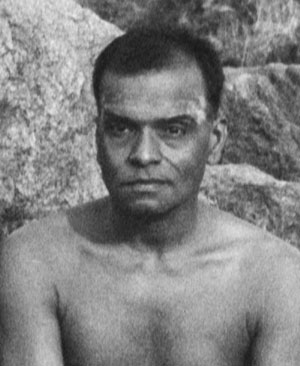
Once Sri T. P. R. and I decided to ask Sri Bhagavan for an explanation of the sixth stanza of Arunachala Ashtakam, and went to the hall after Sri Bhagavan returned from his usual walk on the Hill. In the meanwhile something moved us. Sri Muruganar prostrated before Sri Bhagavan and went out on his usual round for begging food from the town. We had just then ground in the mortar jack fruit for a sweet dish in the meal and Sri Muruganar had given some donation for bhiksha since it was his mother’s death anniversary. He was not there to taste the dish and we were sorry. The fact that he was going out after giving something for a bhiksha in honour of his mother was taken to the notice of Sri Bhagavan. Instantly there was a change in the face of Bhagavan. He knew that Sri Muruganar was not a favourite with the ashram management.
‘Who has to invite him to stay for meals? Chinnaswami does not like him. He is the master here.’
There was tension in the atmosphere. T. P. R. and I whispered to each other that we would choose some other time for the closed our books. Sri Bhagavan saw us doing so and asked us what the matter was. We told him what we had come for.
Instantly Sri Bhagavan said, ‘Why not now?’ and started explaining. It was wonderful! Every sentence started a mighty current. It didn’t stop there. Wave after wave of the same exposition came to us for a day or two more whenever we sat before him.
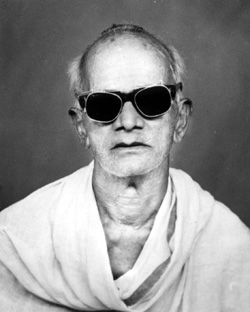
Sri Bhagavan had his head shaved once a month on the full moon day. Natesan was the barber who used to do this service. Bhagavan sat on a stool and Natesan would stand and shave him. Once Sri Bhagavan suggested to Natesan in all seriousness that it would be more comfortable for the barber to sit on the stool while he himself would sit on the floor!
It was past 8-30 one night the ashram on one of my visits. Everyone had retired to rest after the night meal. I went to the office. Chinnaswamy was sitting in his place talking to some ashramites.
When he saw me enter he said, ‘Narayana Iyer, don’t go near Sri Bhagavan’s couch. He is resting on the verandah near the wall. He had had a fracture of his collar bone and a plaster has been put on it. He should not be disturbed. Prostrate at a distance and come away noiselessly.’
I was shocked to hear the news. If any other reason had been given it could have restrained me, but the mention of a ‘fracture’ made me anxious to see Sri Bhagavan. I went on tiptoe and prostrated quietly.
He evidently saw me and said, ‘Narayana Iyer, come and sit by my side on the couch. Only then can I see you and talk. Otherwise the bandage they have put might be disturbed and there might be pain.’
Implicitly I obeyed when he said this, notwithstanding my fear of Chinnaswamy’s reaction if he should happen to see me there.
He said, ‘I was going up the steps. A dog was chasing a squirrel. I barred its way by putting my walking stick in front of it. The stick slipped and I fell down and got hurt on the collar bone. They say it is a fracture and the native bone-setter of the village, an old devotee, was sent for. He has put this bandage with some green leaves and black gram paste and I am enjoined not to move lest it be disturbed.’
He narrated the incident as though it was someone else’s body that was injured and was suffering!
One day in the last weeks of Sri Bhagavan’s illness a devout lady prostrated herself him with her two children, and entreated: ‘Bhagavan, you must not leave the body. You must continue to give us darshan.’
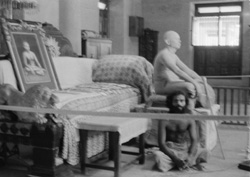
Bhagavan smiled and said: ‘Yes, see there.’ He pointed to the sculptor at work on a statue of the Maharshi in granite. ‘They are chiselling a Bhagavan who will give you darshan always.’
Then he turned to the rest and said: ‘Now these have become my gurus. I have been saying “give up your dehatma-buddhi [identification with the body].” They now want me to cling to the body.’
After a pause, he continued: ‘You see what it means? I must not leave this body so that I can give her darshan always. To have darshan she too must not die. And what about her children? They too must always have darshan. So, nobody should die.’
The truth was grimly portentous, and told in his own unique way.
[V Ganesan recorded an incident in which Bhagavan and Narayana Iyer discussed giving up the ‘I am the body’ idea:
Sri R. Narayana Iyer, retired Sub-registrar, once told me that he asked Sri Bhagavan about too much emphasis being given by Ramana-devotees to the discarding of the I-am-the-body idea and said that this was impossible for him since he was always aware of this body and its creature comforts. Sri Bhagavan graciously remarked: ‘Yes, yes. You cannot give up the I-am-the-body consciousness without being first aware of it. There is nothing wrong with that. The giving up of the idea should take place by the grace of God, for by our own effort it will be very difficult.’
The final extract in this post was written by Narayana Iyer a few months after Bhagavan passed away in 1950.]
‘Before some stars appear, light appears. After they vanish from vision, light alone remains. That is the state of a jnani – his birth and death.’
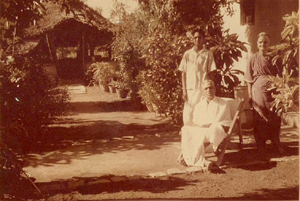
These were the words of Sri Bhagavan in a talk about jnanis. The exact import of the words is as puzzling as the strange phenomena that occurred on the 14th April, 1950 and passed vividly before our eyes. It was about a quarter to nine at night. I was sitting in the open space in front of my house facing east. The sky was clear, the air still. A grave and subdued solemnity pervaded the atmosphere as though reflecting the anxiety of so many sincere devotees of the Maharshi who had come to Tiruvannamalai on account of his illness.
Suddenly a bright and luminous body arose from the southern horizon, slowly went up and descended in the north somewhere on Arunachala Hill. It was not a meteor as it was bigger than what Venus looks to our vision, and its movement was slow. It was so lustrous that, as it was at the zenith, the light shed by its trail stretched as far as the horizon, like an arc. The sight dazed me. Instinctively as it were I jumped to my feet and ran as fast as I could to the ashram a hundred yards off. There was a crowd of people moving about and quite a hustle and bustle. It didn’t strike me to enquire of anyone what it was about. Access to the Maharshi was naturally then select and restricted to a few. I cared not for the ashram rules and regulations, but like a tethered calf let loose and running to its mother, I took a short cut, jumped into the garden, scaled the parapet and rushed into the room where the Maharshi, Bhagavan, my Ramana, Guru, Father, God in flesh and blood was lying.
Lo! My heart thumped. Breath choked. He was no longer in the flesh and blood. He had just breathed his last. As the star descended on the Hill, he had left the body. It was held in padmasana position by the attendants. I touched the body. There was no warmth. I clasped in frenzied hold the hand, the mere touch of which used to give the thrill of eternity. Coldness of death frenzied my nerves. All was over like a dream. Sobs and hymns and chanting filled the air, and my head reeled with dizzy thoughts. We will no longer see our dear Bhagavan in that beautiful form of molten gold in which he charmed and enchanted us for decades! We will no longer see those compassionate eyes that gleamed like twin stars and peered into our innermost depths and dispelled the shadows that blurred our vision and understanding! No more that kind and godly look of grace that solaced our wearied souls and inspired our depressed hearts in speechless silence with peace unbounded, or that bewitching and enchanting radiant smile that fascinated us and drew us to him to heights of bliss, far far above this world. No more could we hear that sweet and ringing voice, the talks of sparkling wit and humour, or those words of profound wisdom from the depths of deep realization which intellect could not fathom! Tears gushed forth from my eyes as from a fountain. ‘Roll! Roll! You beads of love, from the fountain of love to the ocean of love!’ It is not fruit and flowers, nor sweets and savoury dishes that can be offered at your feet anymore. The only oblation that would reach you are tears of love from that perennial spring that is the core of our being of which you are the source in your disembodied fullness. The divine leela is over.
So his leela was really over on that momentous fourteenth day of April, 1950. No one was kept in doubt or suspense or taken by surprise. It was a prolonged ailment, and abundant opportunity was afforded to one and all from far and near to come and see him. It was one of the worst maladies that could afflict the human frame, and the way he bore it was an object lesson to all. Not once did his face reveal agony or suffering, but he carried on the normal routine with his majestic smile of supreme bliss on his face, and the mirthful repartees and sallies of wit. It was also plain that he used no mysterious yogic or superhuman powers to alleviate or conquer pain as the following remark he made about the disease would show: ‘Appah! Who could conceive that such a disease as this could be in this world? When a hiccough comes, the whole body splits like the flashes of lightning in a cloud!’ This remark was made by him in such a cool and composed way as though it was not his body that was suffering.